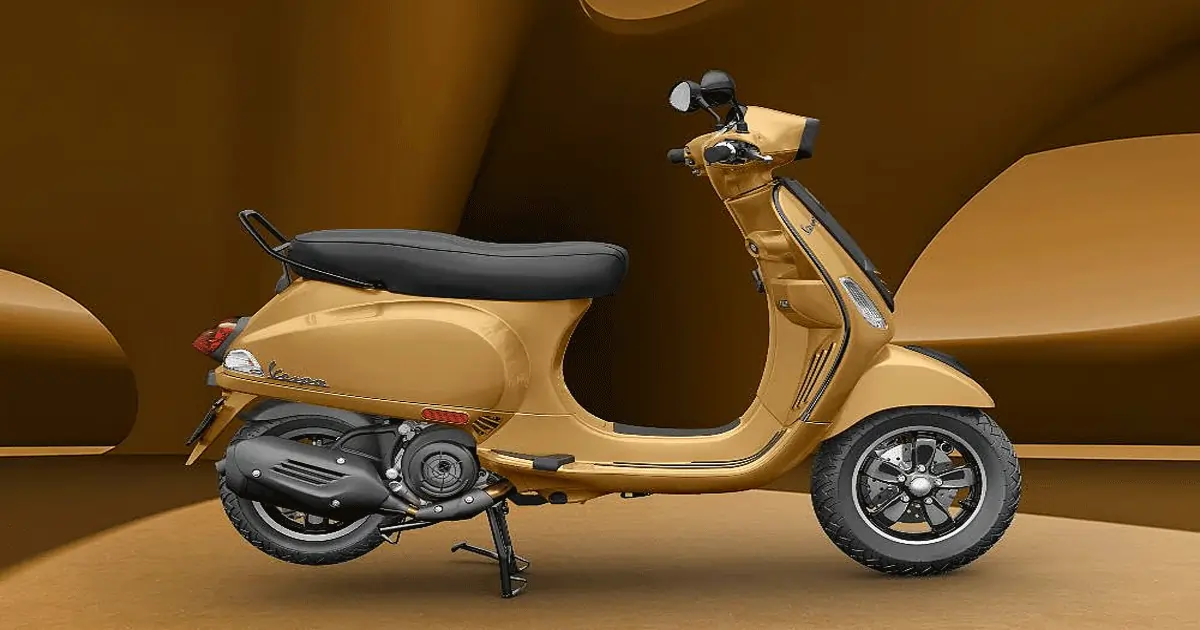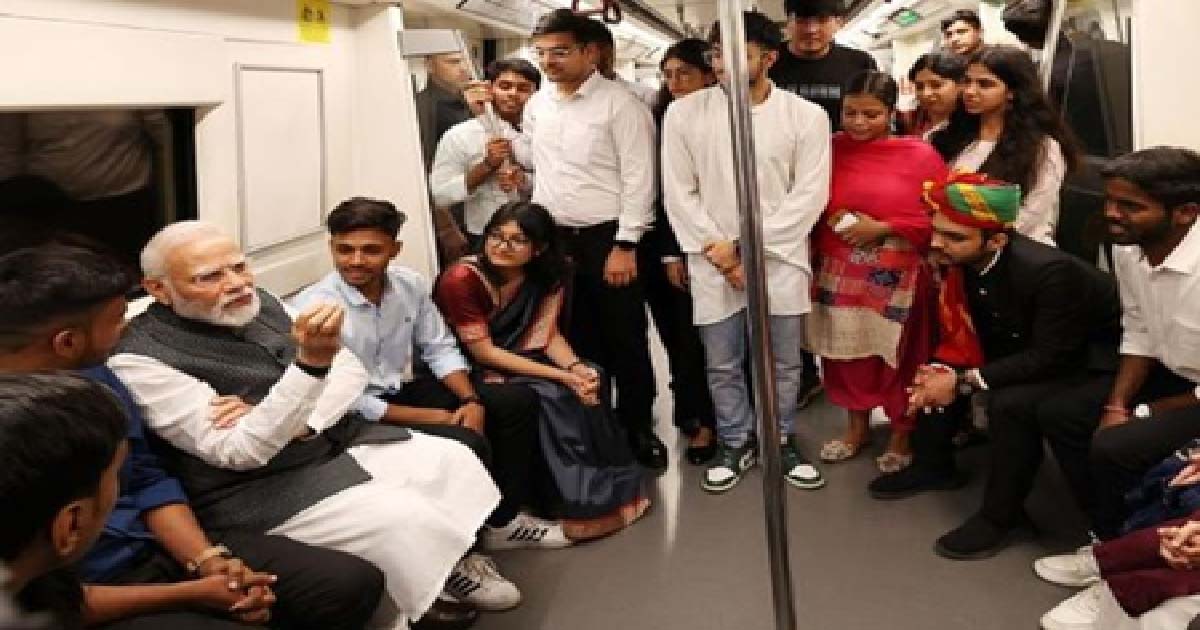Business
2025 Vespa 125 Launched in India – Prices Start at Rs 1.32 Lakh

Vespa has unveiled its updated 2025 scooter lineup in India, introducing the new Vespa 125 with prices starting at Rs 1.32 lakh (ex-showroom). The 125cc range consists of four variants, with the top-spec ‘S Tech’ version priced at Rs 1.96 lakh. While the company has announced pricing for the 125cc models, details for the 150cc versions are expected at a later date.
The latest lineup brings subtle design refinements while maintaining Vespa’s signature retro styling. The scooters now come in fresh colour options, including both single and dual-tone shades. The base Vespa 125 retains its classic appeal with an oval headlamp and smooth, flowing bodywork, while the Vespa S features a more dynamic look with a trapezoidal headlamp. Despite the visual updates, Vespa continues to use its durable monocoque metal body, ensuring longevity and a premium feel.
The Vespa S 125 has been launched in India at Rs 1.36 lakh (ex-showroom), making it Rs 4,000 costlier than the standard model. This premium variant enhances the riding experience with a more stylish appeal and a wider range of colour options. Buyers can choose from eight distinct shades, including Pearl White, Matte Verde Ambizioso, Oro, Matte Nero Black, Red & Pearl White, Matte Giallo Yellow, Arancio Impulsivo, and Black & Pearl White.
Among these, the ‘Oro’ shade stands out with its elegant gold finish, reflecting India’s cultural affinity for gold. Meanwhile, the standard Vespa 125 is available in seven colour choices, such as Rosso Red, Pearl White, Nero Black, and Azzurro Provenza, giving buyers plenty of options to match their style.
Vespa has refined its 125cc and 150cc engine lineup, bringing subtle yet meaningful improvements in performance. The updated 125cc engine now delivers 9.3bhp at 7,100rpm and 10.1Nm of torque at 5,600rpm, while the 150cc variant produces 11.4bhp at 7,500rpm and 11.66Nm at 6,100rpm. These upgrades result in a slight increase in power and torque over the previous models, enhancing the riding experience.
In addition to mechanical updates, Vespa has introduced two new premium variants—the Vespa Tech and Vespa S Tech. These models feature updated styling and come equipped with modern features such as a 5-inch TFT display, Bluetooth connectivity, navigation, and keyless ignition. The Vespa Tech, priced at Rs 1.92 lakh (ex-showroom, Maharashtra), is available in three distinct colours: Energico Blue, Grigio Grey, and the India-exclusive Qala, which incorporates Mehendi-inspired graphics on the body and seat. Meanwhile, the Vespa S Tech, offered in Nero Black (Matte) and Pearl White, sits at the top of the range with a price tag of Rs 1.96 lakh.
Business
Job postings in India stay above pre-Covid pandemic levels: Report

New Delhi, Nov 27: Formal job creation in India softened in the month of October but despite this, job postings remained above the pre-Covid pandemic level, a report said on Thursday.
“Amid slowdown, Indian job postings are still 60 per cent above pre-pandemic levels, but have fallen 25 per cent since their peak in January 2023,” Indeed, a leading hiring platform, said in its report.
Over the past three months, job postings declined in almost three-quarters of occupations. Yet in a softening job market, there will still be some strong performers, and the past three months have been no exception, said the report.
Job postings in cleaning and sanitation rose around 20 per cent over the past three months, ahead of community and social service (17.4 per cent), dental (13.1 per cent), nursing (11.2 per cent) and food preparation and service (10.3 per cent).
Another positive was the posting for human resources, which climbed 2.3 per cent.
However, these gains were more than offset by weakness in banking and finance, where postings fell 25.6 per cent, along with legal (-22.4 per cent), retail (-16.7 per cent) and loading and stocking (-15 per cent), the report noted.
Every month, the Indian workforce gradually transitions towards more formal work arrangements. As the nation transitions, job creation in the formal sector is expected to outpace overall employment growth nationwide, said Callam Pickering, Indeed’s APAC Senior Economist.
“This transition is also why job postings in India have been stronger than in other Indeed markets, both during the post-pandemic job boom and the subsequent slowdown,” he added.
Meanwhile, during the month, 9.1 per cent of Indian job postings explicitly mentioned phrases such as ‘work from home’ or ‘work remotely’ in their job descriptions. That’s up from 7.6 per cent a year ago.
Remote opportunities are most common in IT infrastructure, operations and support at 18.2 per cent of postings in the October quarter 2025, ahead of community & social service (15.1 per cent) and industrial engineering (14 per cent).
Business
From Kachchhi Kharek to Kesar Mango: Over 10 treasures of Kutch and Saurashtra earn GI tag

Gandhinagar, Nov 27: Prime Minister Narendra Modi has consistently championed India’s indigenous and heritage products, placing local strength at the heart of national growth. His call for Vocal for Local and Aatmanirbhar Bharat has given visibility to artisans and farmers across the country.
In line with this vision, the Prime Minister has also actively promoted Geographical Indication (GI) products, highlighting them in his radio address Mann Ki Baat and personally felicitating artisans who preserve traditional crafts.
Union Commerce and Industry Minister Piyush Goyal has set an ambitious goal of reaching 10,000 GI-tagged products across India by 2030 under the vision of “Vikas Bhi, Virasat Bhi.”
Gujarat has emerged as a strong contributor to this national mission by promoting its rich artisanal heritage, from Kutch’s celebrated crafts to Saurashtra’s premium agricultural produce on global platforms.
GI tagging reinforces the state’s commitment to “Viksit Gujarat to Viksit Bharat,” transforming local skills into global competitiveness. Kutch and Saurashtra together have secured GI recognition for over ten iconic products, including Ajrakh block printing, Bandhani tie-dye, Rogan art, Kutch shawls, the famed Kachchhi Kharek, and the globally loved Gir Kesar mango.
The upcoming Vibrant Gujarat Regional Conference (VGRC) in Rajkot will spotlight the region’s craft excellence and export capacity, offering artisans a robust platform to scale their businesses.
Renowned for its blend of tradition and artistry, Kutch boasts GI-tagged crafts such as embroidery, Ajrakh printing, Bandhani, Rogan painting and the Kutch shawl. In the agricultural category, Kachchhi Kharek — a celebrated variety of date known for its rich flavour and nutritional value has also earned GI status.
Saurashtra’s signature products include Gir Kesar mango, often hailed as the “Queen of Mangoes,” the famed Jamnagari Bandhani, and the exquisite Rajkot Patola silk weaving tradition, cherished by Bollywood celebrities.
Surendranagar’s Tangaliya shawl, with its intricate weaving technique, has also built a loyal international following. The upcoming VGRC for Saurashtra and Kutch aims to accelerate the region’s artisan economy.
The two-day conference will bring together entrepreneurs, artisans, interior designers and product designers, creating avenues of collaboration with the Government e-Marketplace, private enterprises, investors and leading e-commerce platforms. The event promises to enhance innovation, expand market access and drive sustainable growth for traditional craft clusters.
Business
Young innovators worldwide can find inspiration from confidence of India’s Gen Z: PM Modi

New Delhi, Nov 27: Prime Minister Narendra Modi on Thursday lauded India’s Generation Z for their confidence and capacity building.
Speaking via video conferencing at the inauguration of the Infinity Campus of Indian space startup Skyroot and unveiling its first orbital rocket, Vikram-I, PM Modi praised the country’s Gen Z for their positive mindset and creativity.
“Our youth, our Gen Z, are developing solutions to challenges in every sector. Young innovators around the world can find inspiration from the confidence of India’s Gen Z,” PM Modi said.
“The capacity building, positive mindset, and creativity of India’s Gen Z can set a global benchmark for Gen Z across the world,” he said.
Emphasising that India’s youth always place national interest above all and make the best use of every opportunity, PM Modi remarked that when the government opened the space sector, the country’s youth, especially the Gen-Z generation, came forward to take full advantage of it.
He highlighted that today more than 300 space startups are giving new hope to India’s space future, and noted that most of these startups began with small teams — sometimes two people, sometimes five, sometimes in a small rented room — with limited resources but with determination to reach new heights.
“This spirit has given birth to the private space revolution in India,” said the Prime Minister. He noted that Gen-Z engineers, designers, coders, and scientists are creating new technologies, whether in propulsion systems, composite materials, rocket stages, or satellite platforms.
PM Modi stressed that India’s youth are working in areas that were unimaginable just a few years ago.
He remarked that India’s private space talent is establishing a distinct identity across the world and added that today, for global investors, India’s space sector is becoming an attractive destination.
The Prime Minister remarked that the changes being witnessed in the space sector are part of the broader startup revolution taking place in India.
“Over the past decade, a new wave of startups has emerged across diverse sectors such as fintech, agri tech, health tech, climate tech, edu tech, and defense tech, with India’s youth, particularly the Gen-Z generation, providing innovative solutions in every field,” PM Modi said.
PM Modi emphasised that “India has now become the world’s third-largest startup ecosystem”.
There was a time when startups were confined to a few big cities, but today they are emerging from small towns and villages as well, the Prime Minister said, underlining that the country now has more than 1.5 lakh registered startups, with many of them having achieved unicorn status.
“India is no longer confined to apps and services but is now advancing rapidly towards deep-tech, manufacturing, and hardware innovation,” said the Prime Minister, thanking Gen-Z.
-

 Crime3 years ago
Crime3 years agoClass 10 student jumps to death in Jaipur
-

 Maharashtra1 year ago
Maharashtra1 year agoMumbai Local Train Update: Central Railway’s New Timetable Comes Into Effect; Check Full List Of Revised Timings & Stations
-

 Maharashtra1 year ago
Maharashtra1 year agoMumbai To Go Toll-Free Tonight! Maharashtra Govt Announces Complete Toll Waiver For Light Motor Vehicles At All 5 Entry Points Of City
-

 Maharashtra1 year ago
Maharashtra1 year agoFalse photo of Imtiaz Jaleel’s rally, exposing the fooling conspiracy
-

 National News1 year ago
National News1 year agoMinistry of Railways rolls out Special Drive 4.0 with focus on digitisation, cleanliness, inclusiveness and grievance redressal
-

 Maharashtra1 year ago
Maharashtra1 year agoMaharashtra Elections 2024: Mumbai Metro & BEST Services Extended Till Midnight On Voting Day
-

 National News1 year ago
National News1 year agoJ&K: 4 Jawans Killed, 28 Injured After Bus Carrying BSF Personnel For Poll Duty Falls Into Gorge In Budgam; Terrifying Visuals Surface
-

 Crime1 year ago
Crime1 year agoBaba Siddique Murder: Mumbai Police Unable To Get Lawrence Bishnoi Custody Due To Home Ministry Order, Says Report












